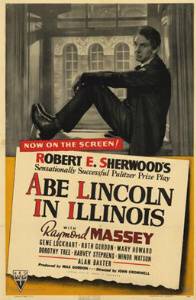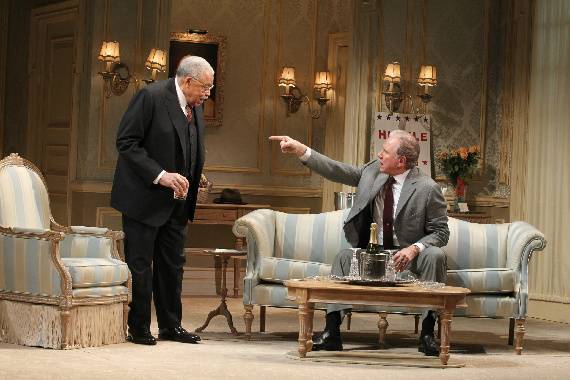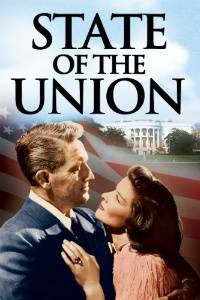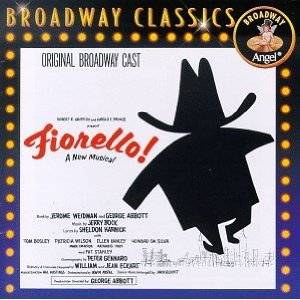It is the season for politics, and the recent staging of 44 Plays for 44 Presidents at Krannert demonstrates that American playwrights do not — and have not — neglected the subject of our political heritage. It is perhaps a bit disconcerting that not all of the quality scripts have been transferred to video format. But, let’s look at what is on the printed page.
No great American playwright has been more neglected in this era than Maxwell Anderson, once considered the equal of Eugene O’Neill. His two political plays have all but vanished from the American stage and we are the poorer for it. First Flight, a play about Andrew Jackson, which he co-wrote with Laurence Stallings is not in print and forgotten. Both Your Houses from 1933, won a Pulitzer Prize for its incisive indictment of dishonesty in American politics. Yet, it only ran for 72 performances that season, and its uncomfortable reminders of human frailty have never endeared it to the American public.
 In 1939, the Pulitzer Prize winner for drama was Robert Sherwood’s Abe Lincoln in Illinois. This outstanding play is a major challenge to theater companies who must find actors to play such political giants as Stephen A. Douglas and Abraham Lincoln. Fortunately, there is an excellent film version starring Gene Lockhart (Douglas) and Raymond Massey (Lincoln). John Cromwell’s fine directing gives us a wonderful insight into Lincoln’s pre-presidential years.
In 1939, the Pulitzer Prize winner for drama was Robert Sherwood’s Abe Lincoln in Illinois. This outstanding play is a major challenge to theater companies who must find actors to play such political giants as Stephen A. Douglas and Abraham Lincoln. Fortunately, there is an excellent film version starring Gene Lockhart (Douglas) and Raymond Massey (Lincoln). John Cromwell’s fine directing gives us a wonderful insight into Lincoln’s pre-presidential years.
In the midst of World War II, Sidney Kingsley wrote a wonderful play about our nation’s early years, The Patriots. This play examines the bitter discord on the early days of the Republic between Alexander Hamilton and Thomas Jefferson. Kingsley, using real historical records, reminds us that bitter political divides are not a product of our times, and a DVD from the Playbill Store from the Broadway Theatre Archive preserves this rarely performed play.
In 1946, Howard Lindsay and Russel Crouse electrified Broadway with State of the Union. The play, though rarely performed today, was a huge hit and won the Pulitzer Prize for that year. In 1948, Frank Capra’s superb film adaptation became the last word on this story of a presidential contender looking for a way around the political bosses. Capra’s killer cast with Spencer Tracy, Katharine Hepburn, Angela Lansbury, Adolphe Menjou, and Van Johnson is reason enough to see this film, but Capra also perfectly preserved this brilliant script for the big screen.
The late 1950s produced two of the truly great American political plays, Gore Vidal’s The Best Man and Jerome Lawrence and Robert E. Lee‘s The Gang’s All Here. The Lawrence and Lee play takes a somewhat discomforting look at the men who surround a new president, and in 1978 they would examine the politics of the Supreme court with First Monday in October.
The Best Man, as the recent Broadway revival proved, is simply one of the finest plays ever written about the American political system. Chronicling the era of the brokered convention, it takes a tough and wonderfully dramatic look at a battle for a presidential nomination by two very different candidates who view the ethics of politics through very different lenses.

James Earl Jones and John Larroquette in The Best Man. Photo by Joan Marcus.
 Vidal adapted his play for the screen, and gave the 200-page screenplay to Frank Capra. In screenplay time, the rule is: one page of dialog is one minute of screen time. Capra who was in semi-retirement in the early sixties, was not interested in filming a political drama that could run for three hours and twenty minutes, and he called Franklin Schaffner. Schnaffer, who would later triumph with Patton, had just finished directing hit plays in Los Angeles, and was up to the challenge. Trimming Vidal’s adaptation and adjusting certain scenes, he cut the story to just over two and half hours and filmed the best screen adaptation of a political play since State of the Union. This 1964 film is a classic and is available on DVD.
Vidal adapted his play for the screen, and gave the 200-page screenplay to Frank Capra. In screenplay time, the rule is: one page of dialog is one minute of screen time. Capra who was in semi-retirement in the early sixties, was not interested in filming a political drama that could run for three hours and twenty minutes, and he called Franklin Schaffner. Schnaffer, who would later triumph with Patton, had just finished directing hit plays in Los Angeles, and was up to the challenge. Trimming Vidal’s adaptation and adjusting certain scenes, he cut the story to just over two and half hours and filmed the best screen adaptation of a political play since State of the Union. This 1964 film is a classic and is available on DVD.
Gore Vidal would have another plunge into political writing for the stage, profiling a man he hated. An Evening with Richard Nixon is a brutal, but often hilarious satire that uses many of Nixon’s own words. In 1972, Nixon was still president when this play opened on Broadway, and it did poorly at the box office despite getting some good reviews; it ran for only about thirty performances and has largely been forgotten, a fate not shared with its subject.
Finally, there are musicals about politics, OK just a couple, but they are quite good. Stephen Sondheim’s Assassins is a tour de force of presidential assassins set to music. Since its debut in 1991, this work by Jerome Weidman and Sondheim has thrilled and shocked audiences. When Garfied assassin Charles Guiteau, sings his own death song using Sondheim’s brilliant arrangements interposed with his own mindless poetry, the hair really stands up on the back of your neck.
 Municipal politics are not forgotten either and the team that gave us Fiddler on the Roof also gave us Fiorello! In 1959, Sheldon Harnik and Jerry Bock gave us a musical history lesson of Fiorello LaGuardia’s campaign against the Tammany Hall political machine in New York City. Tom Bosley was a superb Fiorello, with Jerome Weidman and George Abbott providing a superb book from Ernest Cuneo’s monograph, Life with Fiorello. The history and the music really worked wonderfully. It ran for 795 performances, won the Pulitzer Prize and six Tony Awards, including Best Actor, Best Director, and Best Musical. Yet, it is rarely performed today, was never made into a movie, and is mostly survived by a cast CD. What happened? Is it too New York, too old fashioned? Or maybe it is just one of those shows that is on a down cycle of trendiness. Yet, Bock and Harnik’s score still soars. Listen to “Little Tin Box.” No finer song has ever been written about politicians on the take.
Municipal politics are not forgotten either and the team that gave us Fiddler on the Roof also gave us Fiorello! In 1959, Sheldon Harnik and Jerry Bock gave us a musical history lesson of Fiorello LaGuardia’s campaign against the Tammany Hall political machine in New York City. Tom Bosley was a superb Fiorello, with Jerome Weidman and George Abbott providing a superb book from Ernest Cuneo’s monograph, Life with Fiorello. The history and the music really worked wonderfully. It ran for 795 performances, won the Pulitzer Prize and six Tony Awards, including Best Actor, Best Director, and Best Musical. Yet, it is rarely performed today, was never made into a movie, and is mostly survived by a cast CD. What happened? Is it too New York, too old fashioned? Or maybe it is just one of those shows that is on a down cycle of trendiness. Yet, Bock and Harnik’s score still soars. Listen to “Little Tin Box.” No finer song has ever been written about politicians on the take.
With interest in politics always on the front burner, it is hard to resist the thought that many of these neglected stage treasures will find their way back onto our stages. The human foibles of politics, like the weather, just won’t go away.








